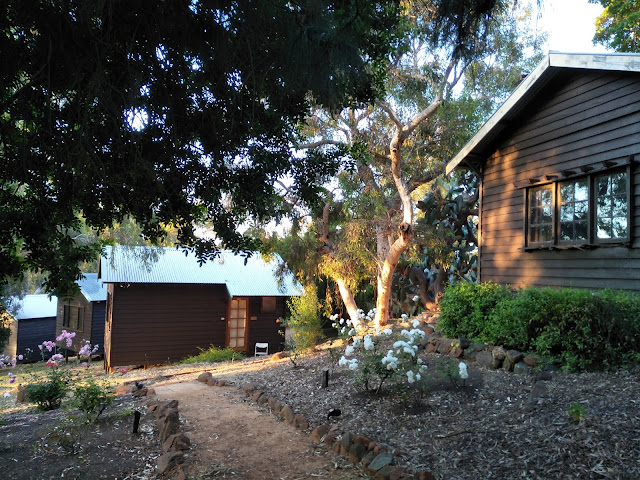My first writing residency
I arrived at Katharine Susannah Prichard Writers’ Centre from
Melbourne via a short trip to Hong Kong and a red-eye flight. Had I arrived a
few years ago, I would have researched ‘how best to use one’s time at a writing
residency’. Instead, I spent my first two days sleeping, reading books by and
on Eileen Chang and modern Chinese literature, taking notes, editing an old-ish
essay, and stressing about not writing.
A few days into the residency, I listened to the soundtrack
of Crazy Rich Asians and start to write. I thought about why and what I want to write and followed my interests. Rather than trying
to complete polished essays, I focused on research and developing new ideas,
some of which may never be published but nevertheless inform my work.
A year ago, I wrote in my KSP Fellowship application:
I will have a revised draft to
edit and refine during the Fellowship late next year.
I thought I would have had a clear direction and several
complete essays by the time I arrived at KSPWC, but all I had were the draft of
one essay and some notes. Caught up in events and writing commissions, I barely
thought about the collection all year. Having written about sex/pain/men/trauma
for the past three years and an extremely well-received essay for Meanjin, I felt like I was at a
crossroads.
I re-visited descriptions of my manuscript for the KSP
Fellowship and realised I either had outgrown work intended for the manuscript
or had written and published it. And so, I turned to interviews with Durga
Chew-Bose. I love, love, love her essay collection Too Much and Not the Mood and see it as a blueprint for what I hope
to achieve. In an interview
with Passerbuys, Chew-Bose says:
I feel so much of my writing is trying to connect ideas or images that I have no idea why they resurface in my mind, but there's a reason. It's my job, I feel, to kind of make that connection.
I read film criticism on Ang Lee’s adaptation of Lust, Caution. I re-watched Wong
Kar-Wai’s In the Mood for Love and
took notes on dialogue, cinematic techniques and my response. I read poetry by
Sennah Yee at midnight, interviews in the morning, and ordered her collection How Do I Look?
I posted on Instagram about my anxiety of ‘wasting’ this
opportunity and my friends responded with encouragement. I went out for lunches
and dinners with Perth-based writer friends and was reminded that community
comes in many forms. For me, my community is often digital and with other
writers of colour. Thank you Rafeif, Sarah, Liz and Rashida for the generous heart-to-hearts!
I am deeply grateful to Rashida Murphy for her sponsoring of the CALD
scholarship and to 2008 KSP Writer-in-Residence Alice Pung for encouraging me
to apply for a residency.
I ‘re-learnt’ many lessons about the writing process,
including trusting my intuition, tapping into unexpected inspiration, and (again)
giving myself the permission to write about topics I am less familiar with or
‘overfamiliar’ with. I was reminded that writing is not just about word count
or publication.
I drew inspiration from KSPWC's collection of Westerly Magazine and Ella Jeffery's essay 'A Mirror in the Dark'. I also drew on the sharp burst of ruby grapefruit slicing through the silence, watching the sun set from my desk, and from a particularly vivid dream: noise bubbles from between my lips.
As the residency drew to a close, I discovered the library room
and was even brave (!) enough to dine alone on the verandah of the main house.
I submitted an essay for publication and wrote, compiled and roughly ordered pages
and pages of ideas and notes for future work. Seedlings, as opposed to
bouquets.
What luxury to wake each day and have no commitments but to
write! The physical, emotional and psychological space and freedom I was
afforded at KSPWC was refreshing. I was able to create freely, without
deadlines, event obligations, or expectations around word count or immediate
publishable outcomes. This makes the residency inviting and valuable for
writers at varying stages of their projects.
The residency was invaluable in feeling my way towards what I want my collection to be and will
inform essays on silence, loneliness, Chinese identity and femininities, language,
domesticity, and intimacy. I feel the freest, as an artist, in years and look
forward to building on this period of rest and growth.



